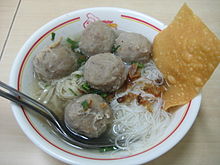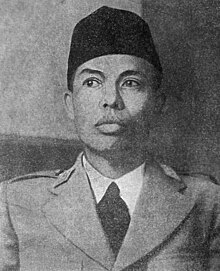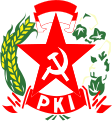Selamat Datang / Welcome to the Indonesian Portal


Indonesia, officially the Republic of Indonesia, is a country in Southeast Asia and Oceania between the Indian and Pacific oceans. It consists of over 17,000 islands, including Sumatra, Java, Sulawesi, and parts of Borneo and New Guinea. Indonesia is the world's largest archipelagic state and the 14th-largest country by area, at 1,904,569 square kilometres (735,358 square miles). With over 279 million people, Indonesia is the world's fourth-most-populous country and the most populous Muslim-majority country. Java, the world's most populous island, is home to more than half of the country's population.
Indonesia is a presidential republic with an elected legislature. It has 38 provinces, of which nine have special autonomous status. The country's capital, Jakarta, is the world's second-most-populous urban area. Indonesia shares land borders with Papua New Guinea, East Timor, and the eastern part of Malaysia, as well as maritime borders with Singapore, Vietnam, Thailand, the Philippines, Australia, Palau, and India. Despite its large population and densely populated regions, Indonesia has vast areas of wilderness with the world's second-highest levels of biodiversity after Brazil.
Indonesia consists of thousands of distinct native ethnic and hundreds of linguistic groups, with Javanese being the largest. A shared identity has developed with the motto "Bhinneka Tunggal Ika" ("Unity in Diversity" literally, "many, yet one"), defined by a national language, cultural diversity, religious pluralism within a Muslim-majority population, and a history of colonialism and rebellion against it. The economy of Indonesia is the world's 16th-largest by nominal GDP and the 7th-largest by PPP. It is the world's third-largest democracy, a regional power, and is considered a middle power in global affairs. The country is a member of several multilateral organisations, including the United Nations, World Trade Organization, G20, and a founding member of the Non-Aligned Movement, Association of Southeast Asian Nations, East Asia Summit, D-8, APEC, and the Organisation of Islamic Cooperation. (Full article...)
Selected article -

The New Order (Indonesian: Orde Baru, abbreviated Orba) describes the regime of the second Indonesian President Suharto from his rise to power in 1966 until his resignation in 1998. Suharto coined the term upon his accession and used it to contrast his presidency with that of his predecessor Sukarno (retroactively dubbed the "Old Order" or Orde Lama).
Immediately following the attempted coup in 1965, the political situation was uncertain, and Suharto's New Order found much popular support from groups wanting a separation from Indonesia's problems since its independence. The 'generation of 66' (Angkatan 66) epitomised talk of a new group of young leaders and new intellectual thought. Following Indonesia's communal and political conflicts, and its economic collapse and social breakdown of the late 1950s through to the mid-1960s, the "New Order" was committed to achieving and maintaining political order, economic development, and the removal of mass participation in the political process. The features of the "New Order" established from the late 1960s were thus a strong political role for the military, the bureaucratisation and corporatisation of political and societal organisations, and selective but brutal repression of opponents. Strident anti-communist, anti-socialist, and anti-Islamist doctrine remained a hallmark of the presidency for its subsequent 30 years. (Full article...)Selected picture
Selected foods and cuisines -
Related portals
Religions in Indonesia
Southeast Asia
Other countries
Selected biography -
Sudirman (Old Spelling: Soedirman; 24 January 1916 – 29 January 1950) was a high-ranking Indonesian military officer during the Indonesian National Revolution. The first commander of the Indonesian National Armed Forces, he continues to be widely respected in the country.
Born in Purbalingga, Dutch East Indies, Sudirman moved to Cilacap in 1916 and was raised by his uncle. A diligent student at a Muhammadiyah-run school, he became respected within the community for his devotion to Islam. After dropping out of teacher's college, in 1936 he began working as a teacher, and later headmaster, at a Muhammadiyah-run elementary school. After the Japanese occupied the Indies in 1942, Sudirman continued to teach, before joining the Japanese-sponsored Defenders of the Homeland as a battalion commander in Banyumas in 1944. In this position he put down a rebellion by his fellow soldiers, but was later interned in Bogor. After Indonesia proclaimed its independence on 17 August 1945, Sudirman led a break-out then went to Jakarta to meet President Sukarno. Tasked with overseeing the surrender of Japanese soldiers in Banyumas, he established a division of the People's Safety Body there. On 12 November 1945, at an election to decide the military's commander-in-chief in Yogyakarta, Sudirman was chosen over Oerip Soemohardjo in a close vote. While waiting to be confirmed, Sudirman ordered an assault on British and Dutch forces in Ambarawa. The ensuing battle and British withdrawal strengthened Sudirman's popular support, and he was ultimately confirmed on 18 December. (Full article...)Did you know -
- ... that during the Indonesian National Revolution the country's first flag, Bendera Pusaka (first hoisting pictured), was cut in half to save it from the Dutch military forces?
- ... that Jamila dan Sang Presiden, submitted to the 82nd Academy Awards for Best Foreign Language Film, was initially written after the director received a UNICEF grant?
- ... that among Amir Hamzah's works are poems that are both explicitly religious and have an erotic element present?
More Did you know (auto generated)

- ... that interfaith greetings in Indonesia include phrases from Islam, Christianity, Hinduism, Buddhism, and Confucianism?
- ... that Paul Gutama Soegijo travelled from Germany to Indonesia to study the gamelan instruments of Java for eight years?
- ... that as mayor, Muhammad Saleh Arifin permitted a temporary gambling area in Medan, Indonesia, saying that it would fund a new street?
- ... that as finance minister, Surachman Tjokroadisurjo often stored government funds inside suitcases in his home?
- ... that Kurnianingrat helped historian George McTurnan Kahin smuggle speeches by leaders of the Indonesian revolution from the Dutch?
- ... that the rector of the University of Indonesia, Muhammad Kamil Tadjudin, introduced a non-thesis degree policy that allowed students to graduate without publishing a thesis?
In this month
- 10 April 1815 – Mount Tambora, on the island of Sumbawa, erupts, leading to the year without a summer
- 18 April 1955 – The Asian–African Conference, an important step towards the establishment of the Non-Aligned Movement, begins (building pictured)
- 20 April 1975 – Taman Mini Indonesia Indah, a large cultural park in Jakarta, opens
- 21 April 1879 – Women's rights figure Kartini is born; this date continues to be celebrated as Kartini Day
- 24 April 1778 – The Royal Batavian Society of Arts and Sciences, one of the first scientific groups in the country, is established
General images
Topics
Categories
New articles
Rules | Match log | Results page (for watching) | Last updated: 2024-04-14 21:11 (UTC)
Note: The list display can now be customized by each user. See List display personalization for details.
- 1993 Indonesian Open (edit | talk | history | links | watch | logs | tools) by Wolbo (talk · contribs · new pages (12)) started on 2024-04-14, score: 63
- 1994 Indonesia Open (edit | talk | history | links | watch | logs | tools) by Wolbo (talk · contribs · new pages (12)) started on 2024-04-14, score: 63
- 1995 Indonesia Open – Doubles (edit | talk | history | links | watch | logs | tools) by Wolbo (talk · contribs · new pages (12)) started on 2024-04-14, score: 42
- 1995 Indonesia Open – Singles (edit | talk | history | links | watch | logs | tools) by Wolbo (talk · contribs · new pages (12)) started on 2024-04-14, score: 42
- 1995 Indonesia Open (edit | talk | history | links | watch | logs | tools) by Wolbo (talk · contribs · new pages (12)) started on 2024-04-13, score: 63
- Melitha Sidabutar (edit | talk | history | links | watch | logs | tools) by N. Alicia J (talk · contribs · new pages (8)) started on 2024-04-13, score: 63
- Zakaria bin Muhammad Amin (edit | talk | history | links | watch | logs | tools) by N. Alicia J (talk · contribs · new pages (8)) started on 2024-04-06, score: 102
- List of crocidurines (edit | talk | history | links | watch | logs | tools) by PresN (talk · contribs · new pages (9)) started on 2024-03-31, score: 52
- 1971 Asian Badminton Championships – Men's team (edit | talk | history | links | watch | logs | tools) by Fanminton (talk · contribs · new pages (10)) started on 2024-04-11, score: 52
- Irzen Hawer (edit | talk | history | links | watch | logs | tools) by QQwhaleQQ (talk · contribs · new pages (3)) started on 2024-04-11, score: 73
- Adzikry Fadlillah (edit | talk | history | links | watch | logs | tools) by PSB33 (talk · contribs · new pages (1)) started on 2024-04-11, score: 42
- Solo Gang (edit | talk | history | links | watch | logs | tools) by Jeromi Mikhael (talk · contribs · new pages (6)) started on 2024-04-10, score: 103
- IP GP Caladium F.C. (edit | talk | history | links | watch | logs | tools) by InsidePitch 48 (talk · contribs · new pages (2)) started on 2024-04-09, score: 63
- Laksamana Raja di Laut (edit | talk | history | links | watch | logs | tools) by N. Alicia J (talk · contribs · new pages (8)) started on 2024-04-06, score: 31
- Caladium F.C. (edit | talk | history | links | watch | logs | tools) by InsidePitch 48 (talk · contribs · new pages (2)) started on 2024-04-09, score: 63
- IGAK Murniasih (edit | talk | history | links | watch | logs | tools) by 1233 (talk · contribs · new pages (2)) started on 2024-04-09, score: 104
- Abubakar Tabuni (edit | talk | history | links | watch | logs | tools) by Gianluigi02 (talk · contribs · new pages (2)) started on 2024-04-09, score: 62
- Sukabumi railway station (edit | talk | history | links | watch | logs | tools) by Naoko Evelyn (talk · contribs · new pages (10)) started on 2024-04-09, score: 42
- Operation 17 Agustus (edit | talk | history | links | watch | logs | tools) by Rembo01 (talk · contribs · new pages (5)) started on 2024-04-09, score: 89
- 2020 North Luwu flash flood (edit | talk | history | links | watch | logs | tools) by Cuises123 (talk · contribs · new pages (4)) started on 2024-04-08, score: 63
- Nadin Amizah (edit | talk | history | links | watch | logs | tools) by Androptrnt (talk · contribs · new pages (4)) started on 2024-04-08, score: 88
- Widjiatno Notomihardjo (edit | talk | history | links | watch | logs | tools) by Juxlos (talk · contribs · new pages (13)) started on 2024-04-08, score: 98
- 2020 North Luwu flash floods (edit | talk | history | links | watch | logs | tools) by Cuises123 (talk · contribs · new pages (4)) started on 2024-04-08, score: 63
- Edy Nasution (edit | talk | history | links | watch | logs | tools) by Juxlos (talk · contribs · new pages (13)) started on 2024-04-08, score: 63
- Al Haris (edit | talk | history | links | watch | logs | tools) by Juxlos (talk · contribs · new pages (13)) started on 2024-04-08, score: 73
- NIHI Sumba (edit | talk | history | links | watch | logs | tools) by Brairkk (talk · contribs · new pages (1)) started on 2024-04-08, score: 21
- Tina Toon (edit | talk | history | links | watch | logs | tools) by Juxlos (talk · contribs · new pages (13)) started on 2024-04-08, score: 63
- Khoirudin (edit | talk | history | links | watch | logs | tools) by Juxlos (talk · contribs · new pages (13)) started on 2024-04-08, score: 63
- Yudi (Melangkah Di Atas Awan) (edit | talk | history | links | watch | logs | tools) by SarahJH07 (talk · contribs · new pages (7)) started on 2024-04-08, score: 43
- Iyeth Bustami (edit | talk | history | links | watch | logs | tools) by N. Alicia J (talk · contribs · new pages (8)) started on 2024-04-06, score: 93
- Gede Sunu (edit | talk | history | links | watch | logs | tools) by Yogwi21 (talk · contribs · new pages (3)) started on 2024-04-07, score: 93
- Mohamad Tony Harjono (edit | talk | history | links | watch | logs | tools) by Jeromi Mikhael (talk · contribs · new pages (6)) started on 2024-04-07, score: 62
- Operation Gunung Gede (edit | talk | history | links | watch | logs | tools) by Rembo01 (talk · contribs · new pages (5)) started on 2024-04-07, score: 52
- Dwiki Dharmawan discography (edit | talk | history | links | watch | logs | tools) by SarahJH07 (talk · contribs · new pages (7)) started on 2024-04-07, score: 63
- Liquidambar excelsa (edit | talk | history | links | watch | logs | tools) by Abductive (talk · contribs · new pages (48)) started on 2024-04-06, score: 28
- Teguh (edit | talk | history | links | watch | logs | tools) by Edwardx (talk · contribs · new pages (75)) started on 2024-04-06, score: 22
- Acteon javanus (edit | talk | history | links | watch | logs | tools) by JoJan (talk · contribs · new pages (79)) started on 2024-04-06, score: 21
- Cryphalus dorsalis (edit | talk | history | links | watch | logs | tools) by Bernhard Zelazny (talk · contribs · new pages (7)) started on 2024-04-05, score: 38
- Channa melanoptera (edit | talk | history | links | watch | logs | tools) by KjjjKjjj (talk · contribs · new pages (18)) started on 2024-04-05, score: 40
- Abdullah Syafi'i (edit | talk | history | links | watch | logs | tools) by Rembo01 (talk · contribs · new pages (5)) started on 2024-04-05, score: 60
- Indra (Melangkah Di Atas Awan) (edit | talk | history | links | watch | logs | tools) by SarahJH07 (talk · contribs · new pages (7)) started on 2024-04-05, score: 53
- Widyanta Putra Teja (edit | talk | history | links | watch | logs | tools) by Skyggestadium (talk · contribs · new pages (3)) started on 2024-04-05, score: 102
- Max Yanto (edit | talk | history | links | watch | logs | tools) by Skyggestadium (talk · contribs · new pages (3)) started on 2024-04-05, score: 83
- Livy Renata (edit | talk | history | links | watch | logs | tools) by Badak Jawa (talk · contribs · new pages (1)) started on 2024-03-25, score: 61
- Battalion 426 rebellion (edit | talk | history | links | watch | logs | tools) by Rembo01 (talk · contribs · new pages (5)) started on 2024-04-04, score: 52
- Massada (band) (edit | talk | history | links | watch | logs | tools) by Karl Twist (talk · contribs · new pages (15)) started on 2024-04-04, score: 22
- Shanaka L de Silva (edit | talk | history | links | watch | logs | tools) by HRShami (talk · contribs · new pages (10)) started on 2024-04-04, score: 21
- Tobati people (edit | talk | history | links | watch | logs | tools) by Faldi00 (talk · contribs · new pages (9)) started on 2024-04-04, score: 80
- Universal Music Indonesia (edit | talk | history | links | watch | logs | tools) by MhdFajar2000 (talk · contribs · new pages (1)) started on 2024-04-04, score: 63
- Nyssa javanica (edit | talk | history | links | watch | logs | tools) by Abductive (talk · contribs · new pages (48)) started on 2024-04-04, score: 28
- Terong Island (edit | talk | history | links | watch | logs | tools) by Warairarepano&Guaicaipuro (talk · contribs · new pages (1)) started on 2024-04-03, score: 63
- Bakbakan, Gianyar (edit | talk | history | links | watch | logs | tools) by Angayubagia (talk · contribs · new pages (1)) started on 2024-04-03, score: 32
- Boxing at the 1962 Asian Games – Men's 57 kg (edit | talk | history | links | watch | logs | tools) by Sports2021 (talk · contribs · new pages (45)) started on 2024-04-02, score: 42
- Boxing at the 1962 Asian Games – Men's 67 kg (edit | talk | history | links | watch | logs | tools) by Sports2021 (talk · contribs · new pages (45)) started on 2024-04-02, score: 42
- Boxing at the 1962 Asian Games – Men's 63.5 kg (edit | talk | history | links | watch | logs | tools) by Sports2021 (talk · contribs · new pages (45)) started on 2024-04-02, score: 42
- Boxing at the 1962 Asian Games – Men's 60 kg (edit | talk | history | links | watch | logs | tools) by Sports2021 (talk · contribs · new pages (45)) started on 2024-04-02, score: 42
- Barasuara (edit | talk | history | links | watch | logs | tools) by Androptrnt (talk · contribs · new pages (4)) started on 2024-04-02, score: 73
- Danella Ilene (edit | talk | history | links | watch | logs | tools) by JoeWill90 (talk · contribs · new pages (1)) started on 2024-04-02, score: 37
- 1994 Uber Cup knockout stage (edit | talk | history | links | watch | logs | tools) by Fanminton (talk · contribs · new pages (10)) started on 2024-04-02, score: 62
- 1994 Uber Cup group stage (edit | talk | history | links | watch | logs | tools) by Fanminton (talk · contribs · new pages (10)) started on 2024-04-02, score: 38
- Boxing at the 1962 Asian Games – Men's 54 kg (edit | talk | history | links | watch | logs | tools) by Sports2021 (talk · contribs · new pages (45)) started on 2024-04-02, score: 42
- Race Across the World series 4 (edit | talk | history | links | watch | logs | tools) by Merely another passerby (talk · contribs · new pages (4)) started on 2024-04-02, score: 69
- Boxing at the 1962 Asian Games – Men's 71 kg (edit | talk | history | links | watch | logs | tools) by Sports2021 (talk · contribs · new pages (45)) started on 2024-04-02, score: 42
- Boxing at the 1962 Asian Games – Men's 81 kg (edit | talk | history | links | watch | logs | tools) by Sports2021 (talk · contribs · new pages (45)) started on 2024-04-02, score: 42
- Boxing at the 1962 Asian Games – Men's 75 kg (edit | talk | history | links | watch | logs | tools) by Sports2021 (talk · contribs · new pages (45)) started on 2024-04-02, score: 42
- Boxing at the 1962 Asian Games – Men's +81 kg (edit | talk | history | links | watch | logs | tools) by Sports2021 (talk · contribs · new pages (45)) started on 2024-04-02, score: 40
- Boxing at the 1962 Asian Games – Men's 51 kg (edit | talk | history | links | watch | logs | tools) by Sports2021 (talk · contribs · new pages (45)) started on 2024-04-02, score: 42
- Lyster H. Dewey (edit | talk | history | links | watch | logs | tools) by Nirva20 (talk · contribs · new pages (154)) started on 2024-04-02, score: 38
- Damián van der Vaart (edit | talk | history | links | watch | logs | tools) by Davidlofgren1996 (talk · contribs · new pages (5)) started on 2024-04-01, score: 33
- Batik Air Flight 6723 (edit | talk | history | links | watch | logs | tools) by TheKeyboardofDoom (talk · contribs · new pages (2)) started on 2024-04-01, score: 82
- 1994 Thomas Cup knockout stage (edit | talk | history | links | watch | logs | tools) by Fanminton (talk · contribs · new pages (10)) started on 2024-04-01, score: 36
- 1994 Thomas Cup group stage (edit | talk | history | links | watch | logs | tools) by Fanminton (talk · contribs · new pages (10)) started on 2024-04-01, score: 35
- 2024 AFC U-23 Asian Cup squads (edit | talk | history | links | watch | logs | tools) by Thplam2004 (talk · contribs · new pages (15)) started on 2024-04-01, score: 70
- Pittosporum moluccanum (edit | talk | history | links | watch | logs | tools) by Tenniscourtisland (talk · contribs · new pages (1)) started on 2024-04-01, score: 54
- Teddy Oetomo (edit | talk | history | links | watch | logs | tools) by Adhmi (talk · contribs · new pages (1)) started on 2024-03-31, score: 43
- 2024 East Java earthquakes (edit | talk | history | links | watch | logs | tools) by Quake1234 (talk · contribs · new pages (1)) started on 2024-03-22, score: 137
WikiProjects
Want to help?:
Associated Wikimedia
The following Wikimedia Foundation sister projects provide more on this subject:
-
 Commons
Commons
Free media repository -
 Wikibooks
Wikibooks
Free textbooks and manuals -
 Wikidata
Wikidata
Free knowledge base -
 Wikinews
Wikinews
Free-content news -
 Wikiquote
Wikiquote
Collection of quotations -
 Wikisource
Wikisource
Free-content library -
 Wikiversity
Wikiversity
Free learning tools -
 Wikivoyage
Wikivoyage
Free travel guide -
 Wiktionary
Wiktionary
Dictionary and thesaurus
-

-

-

-

-
Random portal
Purge server cache























































































































